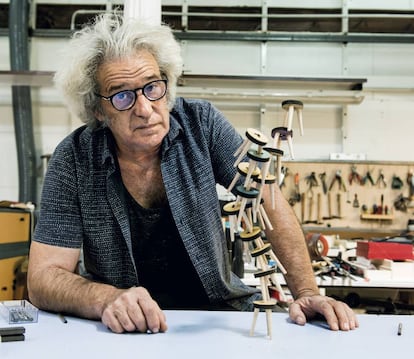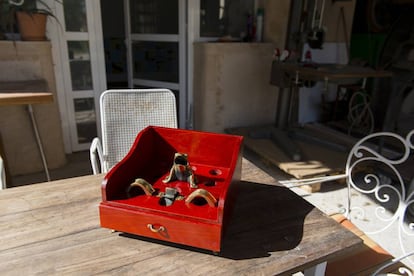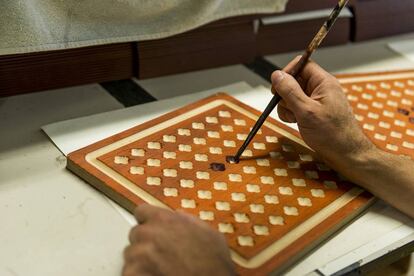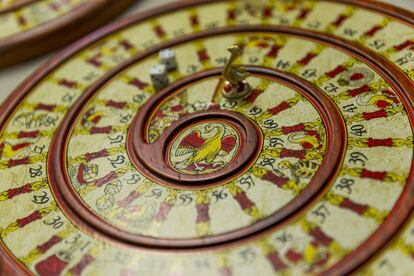From Zamora to MOMA: the Spanish artisan toys winning the world over
The Bermejo brothers’ Pico Pao creations can now be found in fancy store displays across the globe

From Zamora to the Museum of Modern Art (MOMA) in New York and Louis Vuitton’s boutique in Vendome plaza in Paris, Pico Pao’s artisan toys have undergone an incredible journey. And so too have brothers Javier and Miguel Bermejo, the creators of the brand of delicate wooden toys. After studying Arts and Crafts in Madrid in the 70s, the brothers decided to go back to their family home in Lubián, a small town with fewer than 400 residents in Zamora, where they set up a workshop just around the block. They had no idea that 30 years later, their elegant creations would end up in fancy store displays across the globe.

“We began making replicas of old cameras used by the first street artists as well as traditional looms”, says Javier. Shortly after though, Miguel found a book referencing the Royal Game of Ur, an ancient game dating back 4,500 years. The discovery changed his life. The game “was an ancestor of Parchís [an adaptation of the Indian game Parchisi based on a cross and a circle] and it occurred to us we could recreate the game using wood like in the original”, says Javier. This provided the inspiration for the brothers’ Ancient Games collection, an artisan collection of traditional games from different countries across the world.
“Although we had very high hopes, they fell flat on the ground. This was not the right time. We would have to wait 10 years before we started to receive commissions”, Javier recalls. Now however, his Royal Game of Ur is sold at the British Museum store in London.

So how did they eventually achieve success? By modernizing their work? “Not at all. What is modern now will soon become obsolete”. During the economic crisis, in 2010, they lost the majority of their Spanish clients, who represented 90% of their entire clientele. They had to change their business tactics. Javier went back to his old sketches and built one of them. This piece called The Chairs (Las Sillas) was a new construction toy designed by Javier, with no rules or competition between players, or unnecessary bells or whistles.
Javier Bermejo

“It was a hit. It was the birth of our Ludus Ludi collection. With this collection, we left out the violence of the original game and started offering a more poetic and hands-on experience, in which each person competed against themselves. It was a radical change from the original concept of the game. We presented it at the 2011 Maison & Object fair in Paris and the people from MOMA in New York wanted it”. It was the launching pad that would win the Bermejo brothers international recognition.
At that moment, the Bermejo brothers had to make a decision: increase the number of their employees or look for collaborators with whom they could work well. They chose the second option. By scouring for fabrics and artisan work across Spain, they were able to create a network of workshops specialized in different disciplines that could take over certain parts of the manufacturing process.
“We produce work from January to September and the rest of the year we dedicate to distribution”. But Javier’s mind and hands are rarely still and it is not long before a new prototype is created. “It's a rural way of working. You plant ideas and harvest projects. But you don’t do both things every day. It all depends on the mood you are in”.
English version by Laura Rodriguez.
Tu suscripción se está usando en otro dispositivo
¿Quieres añadir otro usuario a tu suscripción?
Si continúas leyendo en este dispositivo, no se podrá leer en el otro.
FlechaTu suscripción se está usando en otro dispositivo y solo puedes acceder a EL PAÍS desde un dispositivo a la vez.
Si quieres compartir tu cuenta, cambia tu suscripción a la modalidad Premium, así podrás añadir otro usuario. Cada uno accederá con su propia cuenta de email, lo que os permitirá personalizar vuestra experiencia en EL PAÍS.
¿Tienes una suscripción de empresa? Accede aquí para contratar más cuentas.
En el caso de no saber quién está usando tu cuenta, te recomendamos cambiar tu contraseña aquí.
Si decides continuar compartiendo tu cuenta, este mensaje se mostrará en tu dispositivo y en el de la otra persona que está usando tu cuenta de forma indefinida, afectando a tu experiencia de lectura. Puedes consultar aquí los términos y condiciones de la suscripción digital.









































